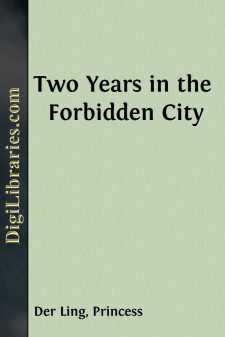Categories
- Antiques & Collectibles 13
- Architecture 36
- Art 48
- Bibles 22
- Biography & Autobiography 813
- Body, Mind & Spirit 142
- Business & Economics 28
- Children's Books 17
- Children's Fiction 14
- Computers 4
- Cooking 94
- Crafts & Hobbies 4
- Drama 346
- Education 46
- Family & Relationships 57
- Fiction 11829
- Games 19
- Gardening 17
- Health & Fitness 34
- History 1377
- House & Home 1
- Humor 147
- Juvenile Fiction 1873
- Juvenile Nonfiction 202
- Language Arts & Disciplines 88
- Law 16
- Literary Collections 686
- Literary Criticism 179
- Mathematics 13
- Medical 41
- Music 40
- Nature 179
- Non-Classifiable 1768
- Performing Arts 7
- Periodicals 1453
- Philosophy 64
- Photography 2
- Poetry 896
- Political Science 203
- Psychology 42
- Reference 154
- Religion 513
- Science 126
- Self-Help 84
- Social Science 81
- Sports & Recreation 34
- Study Aids 3
- Technology & Engineering 59
- Transportation 23
- Travel 463
- True Crime 29
Two Years in the Forbidden City
Categories:
Description:
Excerpt
INTRODUCTORY
MY father and mother, Lord and Lady Yu Keng, and family, together with our suite consisting of the First Secretary, Second Secretary, Naval and Military Attaches, Chancellors, their families, servants, etc.,—altogether fifty-five people,—arrived in Shanghai on January 2, 1903, on the S.S. "Annam" from Paris, where for four years my father had been Chinese Minister. Our arrival was anything but pleasant, as the rain came down in torrents, and we had the greatest difficulty getting our numerous retinue landed and safely housed, not to mention the tons of baggage that had to be looked after. We had found from previous experience that none of our Legation people or servants could be depended upon to do anything when travelling, in consequence of which the entire charge devolved upon my mother, who was without doubt the genius of the party in arranging matters and straightening out difficulties.
When the launch from the steamer arrived at the jetty off the French Bund, we were met by the Shanghai Taotai (the highest official in the city), the Shanghai Magistrate and numerous other officials, all dressed in their official robes. The Taotai told my father that he had prepared the Tien Ho Gung (Temple of the Queen of Heaven) for us to reside in during our stay in Shanghai, but my father refused the offer, saying that he had telegraphed from Hong Kong and made all arrangements to go to the Hotel des Colonies in the French Concession. We had had previous experience staying in this temple while on our way to Japan, where my father went as Minister in 1895, and did not care to try it a second time. The building is very old and very much out of repair. It was a beautiful place in its prime, but had been allowed to go to rack and ruin. The custom is that the magistrate has to find a place and supply the food, etc., for high officials when passing through, and it is not exactly the thing to refuse their kind offer, but my father was always very independent and politely declined all proffers of assistance.
At last we did safely arrive in the Hotel des Colonies, where my father found awaiting him two telegrams from the Imperial Palace. These telegrams ordered my father to go to Peking at once, but, as the river to Tientsin was frozen, it was out of the question for us to go by that route, and as my father was very old and quite ill at that time, in fact constantly under the doctor's care, the only accessible way, via Chinwangtao, was equally out of the question, as it was a long and most tedious journey and quite beyond his strength. In view of all these difficulties, he telegraphed that, after the ice had broken up in the Peiho River, we would come by the first steamer leaving Shanghai for Tientsin.
We left Shanghai on the 22d of February and arrived at Tientsin on the 26th, and, as before, were met by the Customs Taotai of the port and numerous other officials (the same as when we arrived at Shanghai).
There is a very curious custom of reverence, which must be performed by all high officials on their return from abroad....


